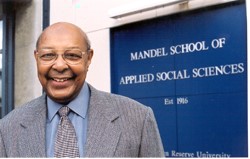Background
Who is Louis Stokes?
 Former U.S. Rep. Louis Stokes played a pivotal role in the quest for civil rights,
equality, and social and economic justice throughout his tenure in the Unites States
Congress. On November 6, 1968, he was elected to the United States Congress and became
the first African American member of Congress from the State of Ohio. He served 15
consecutive terms in the U.S. House of Representatives, ranking eleventh overall in
House seniority.
Former U.S. Rep. Louis Stokes played a pivotal role in the quest for civil rights,
equality, and social and economic justice throughout his tenure in the Unites States
Congress. On November 6, 1968, he was elected to the United States Congress and became
the first African American member of Congress from the State of Ohio. He served 15
consecutive terms in the U.S. House of Representatives, ranking eleventh overall in
House seniority.
During his tenure in Congress, he chaired several important committees in the House. He was the dean of the Ohio Congressional Delegation and a founding member of the Congressional Black Caucus. When Stokes retired, he became the first African American in the history of the U.S. Congress to retire having completed 30 years in office. Following his service in Congress in recognition of his crucial support for equality and economic justice, the original Alliances for Minority Participation (AMP) became the Louis Stokes Alliances for Minority Participation (LSAMP).
NSF Synopsis
The Louis Stokes Alliances for Minority Participation (LSAMP) program is an alliance-based program. The program's theory is based on the Tinto model for student retention1. The LSAMP program takes a comprehensive approach to student development and retention. Particular emphasis is placed on transforming undergraduate STEM education through innovative, evidence-based recruitment and retention strategies, and relevant educational experiences in support of racial and ethnic groups historically underrepresented in STEM disciplines.
The LSAMP program also supports knowledge generation, knowledge utilization, program impact and dissemination type activities. The program seeks new learning and immediate diffusion of scholarly research into the field. Under this program, funding for STEM educational and broadening participation research activities could include research to develop new models in STEM engagement, recruitment and retention practices for all critical pathways to STEM careers or research on interventions such as mentoring, successful learning practices and environments, STEM efficacy studies, and technology use.
Overall, the LSAMP program provides funding to alliances that implement comprehensive, evidence-based, innovative, and sustained strategies that ultimately result in the graduation of well-prepared, highly-qualified students from underrepresented minority groups who pursue graduate studies or careers in STEM.
Project types under this program include:
- Alliances
Alliances are consortia of multiple degree-granting institutions. Organizations from other sectors, including informal science organizations, may be participants. Projects focus on pre-college and undergraduate recruitment and retention activities. Types of LSAMP alliances are described as follows:- STEM Pathways Implementation-Only Alliance projects are mainly focused on a particular STEM pathway, e.g., entry into college, first two years, or preparation for entry into graduate studies. Additionally, the project may focus on activities dedicated to diversifying a particular STEM discipline, e.g., production of mathematicians. These projects are targeted to newly-created alliances, reconstituted alliances or alliances that have received support by the program for less than 10 years. Projects are five years in duration.
- STEM Pathways and Research Alliances are projects that focus on the full STEM pathway and provide direct support for undergraduate students but also serve as a hub for the production of scholarly STEM research and evaluation to increase the knowledge-base and utilization in broadening participation. Both components must be addressed to be competitive for this project type. These are five-year projects.
- Bridge to the Baccalaureate: Alliances involve associate degree producing institutions for which the lead institution must be a community college. These are three-year projects focused on activities that provide effective educational preparation of community college students from underrepresented minority populations for successful transfer to four-year institutions in STEM degree programs.
- Bridge to the Doctorate (BD) Activity: BD projects are two-year projects eligible only to existing alliances funded 10 or more consecutive years. These projects are focused on providing post-baccalaureate fellowship support to a cohort of 12 LSAMP students for the first two years of their STEM graduate studies and providing the necessary academic and research skills that will enable them to successfully earn STEM doctoral degrees and transition into the STEM workforce.
- Louis Stokes Regional Centers of Excellence in Broadening Participation (LSRCE). These centers can serve as regional outreach and knowledge-diffusion centers of excellence for alliance and non-alliance organizations. LSRCE's are projects that have wide latitude for design with a focus on technical assistance in the broadening participation arena, for example, and are focused on increasing the knowledge base on broadening participation topics through research, evaluation and synthesis activities. Centers do not provide direct degree production interventions or student support activities. The projects may be three or five years in duration depending on the scope of activities.
- Pre-Alliance Planning: Pre-Alliance planning projects undertake planning activities necessary to form new alliances. Recipients of pre-alliance planning grants must commit to submission of an alliance or center proposal following the planning period. Projects are up to 18 months in duration.
- Conferences and other supplemental funding opportunities are supported for existing LSAMP alliances or LSAMP institutions. Examples include the NSF-Department of Energy collaboration to provide cutting-edge research experiences to students and faculty participants. These opportunities also may be announced under Dear Colleague Letters. Conference proposals may be submitted under NSF's general proposal guidelines as unsolicited proposals.
---------
1 Clewell, B.C., Cosentino de Cohen, C. , Tsui, L. and Deterding, N. (2006). Revitalizing the Nation's Talent Pool in STEM. Urban Institute. Washington, D.C.